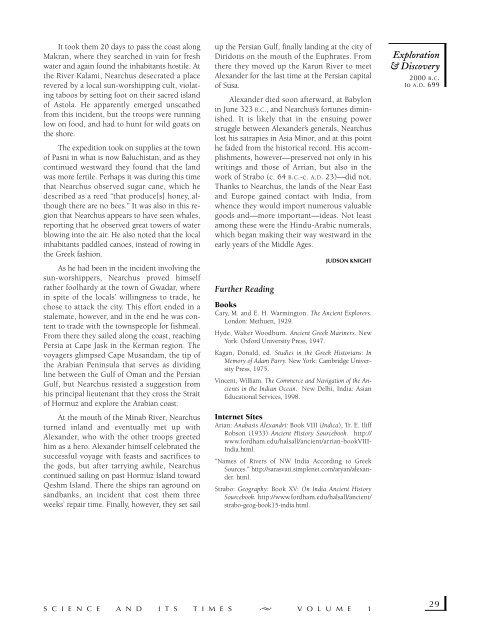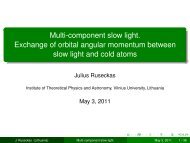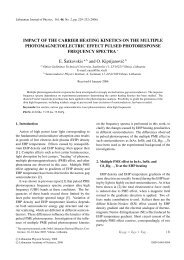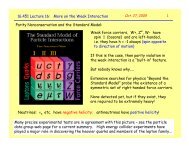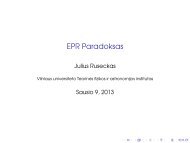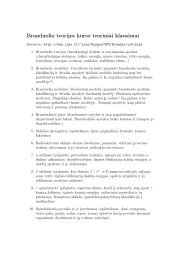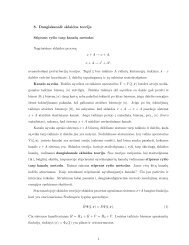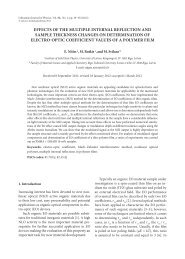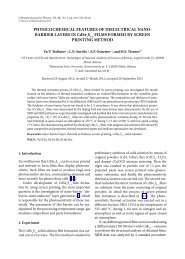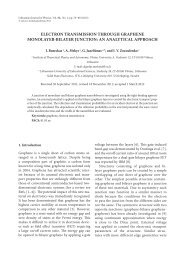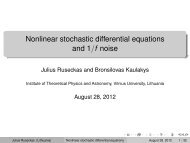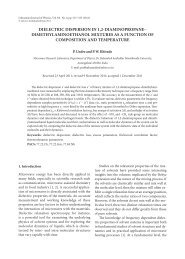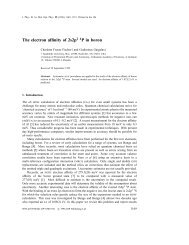Gale - Science and Its Times Vol 01 (2000 BC to AD 699).pdf
Gale - Science and Its Times Vol 01 (2000 BC to AD 699).pdf
Gale - Science and Its Times Vol 01 (2000 BC to AD 699).pdf
Create successful ePaper yourself
Turn your PDF publications into a flip-book with our unique Google optimized e-Paper software.
It <strong>to</strong>ok them 20 days <strong>to</strong> pass the coast along<br />
Makran, where they searched in vain for fresh<br />
water <strong>and</strong> again found the inhabitants hostile. At<br />
the River Kalami, Nearchus desecrated a place<br />
revered by a local sun-worshipping cult, violating<br />
taboos by setting foot on their sacred isl<strong>and</strong><br />
of As<strong>to</strong>la. He apparently emerged unscathed<br />
from this incident, but the troops were running<br />
low on food, <strong>and</strong> had <strong>to</strong> hunt for wild goats on<br />
the shore.<br />
The expedition <strong>to</strong>ok on supplies at the <strong>to</strong>wn<br />
of Pasni in what is now Baluchistan, <strong>and</strong> as they<br />
continued westward they found that the l<strong>and</strong><br />
was more fertile. Perhaps it was during this time<br />
that Nearchus observed sugar cane, which he<br />
described as a reed “that produce[s] honey, although<br />
there are no bees.” It was also in this region<br />
that Nearchus appears <strong>to</strong> have seen whales,<br />
reporting that he observed great <strong>to</strong>wers of water<br />
blowing in<strong>to</strong> the air. He also noted that the local<br />
inhabitants paddled canoes, instead of rowing in<br />
the Greek fashion.<br />
As he had been in the incident involving the<br />
sun-worshippers, Nearchus proved himself<br />
rather foolhardy at the <strong>to</strong>wn of Gwadar, where<br />
in spite of the locals’ willingness <strong>to</strong> trade, he<br />
chose <strong>to</strong> attack the city. This effort ended in a<br />
stalemate, however, <strong>and</strong> in the end he was content<br />
<strong>to</strong> trade with the <strong>to</strong>wnspeople for fishmeal.<br />
From there they sailed along the coast, reaching<br />
Persia at Cape Jask in the Kerman region. The<br />
voyagers glimpsed Cape Mus<strong>and</strong>am, the tip of<br />
the Arabian Peninsula that serves as dividing<br />
line between the Gulf of Oman <strong>and</strong> the Persian<br />
Gulf, but Nearchus resisted a suggestion from<br />
his principal lieutenant that they cross the Strait<br />
of Hormuz <strong>and</strong> explore the Arabian coast.<br />
At the mouth of the Minab River, Nearchus<br />
turned inl<strong>and</strong> <strong>and</strong> eventually met up with<br />
Alex<strong>and</strong>er, who with the other troops greeted<br />
him as a hero. Alex<strong>and</strong>er himself celebrated the<br />
successful voyage with feasts <strong>and</strong> sacrifices <strong>to</strong><br />
the gods, but after tarrying awhile, Nearchus<br />
continued sailing on past Hormuz Isl<strong>and</strong> <strong>to</strong>ward<br />
Qeshm Isl<strong>and</strong>. There the ships ran aground on<br />
s<strong>and</strong>banks, an incident that cost them three<br />
weeks’ repair time. Finally, however, they set sail<br />
up the Persian Gulf, finally l<strong>and</strong>ing at the city of<br />
Diridotis on the mouth of the Euphrates. From<br />
there they moved up the Karun River <strong>to</strong> meet<br />
Alex<strong>and</strong>er for the last time at the Persian capital<br />
of Susa.<br />
Alex<strong>and</strong>er died soon afterward, at Babylon<br />
in June 323 B.C., <strong>and</strong> Nearchus’s fortunes diminished.<br />
It is likely that in the ensuing power<br />
struggle between Alex<strong>and</strong>er’s generals, Nearchus<br />
lost his satrapies in Asia Minor, <strong>and</strong> at this point<br />
he faded from the his<strong>to</strong>rical record. His accomplishments,<br />
however—preserved not only in his<br />
writings <strong>and</strong> those of Arrian, but also in the<br />
work of Strabo (c. 64 B.C.-c. A.D. 23)—did not.<br />
Thanks <strong>to</strong> Nearchus, the l<strong>and</strong>s of the Near East<br />
<strong>and</strong> Europe gained contact with India, from<br />
whence they would import numerous valuable<br />
goods <strong>and</strong>—more important—ideas. Not least<br />
among these were the Hindu-Arabic numerals,<br />
which began making their way westward in the<br />
early years of the Middle Ages.<br />
Further Reading<br />
JUDSON KNIGHT<br />
Books<br />
Cary, M. <strong>and</strong> E. H. Warming<strong>to</strong>n. The Ancient Explorers.<br />
London: Methuen, 1929.<br />
Hyde, Walter Woodburn. Ancient Greek Mariners. New<br />
York: Oxford University Press, 1947.<br />
Kagan, Donald, ed. Studies in the Greek His<strong>to</strong>rians: In<br />
Memory of Adam Parry. New York: Cambridge University<br />
Press, 1975.<br />
Vincent, William. The Commerce <strong>and</strong> Navigation of the Ancients<br />
in the Indian Ocean. New Delhi, India: Asian<br />
Educational Services, 1998.<br />
Internet Sites<br />
Arian: Anabasis Alex<strong>and</strong>ri: Book VIII (Indica), Tr. E. Iliff<br />
Robson (1933) Ancient His<strong>to</strong>ry Sourcebook. http://<br />
www.fordham.edu/halsall/ancient/arrian-bookVIII-<br />
India.html.<br />
“Names of Rivers of NW India According <strong>to</strong> Greek<br />
Sources.” http://sarasvati.simplenet.com/aryan/alex<strong>and</strong>er.<br />
html.<br />
Strabo: Geography: Book XV: On India Ancient His<strong>to</strong>ry<br />
Sourcebook. http://www.fordham.edu/halsall/ancient/<br />
strabo-geog-book15-india.html.<br />
Exploration<br />
& Discovery<br />
<strong>2000</strong> B.C.<br />
<strong>to</strong> A.D. <strong>699</strong><br />
S C I E N C E A N D I T S T I M E S V O L U M E 1<br />
29


